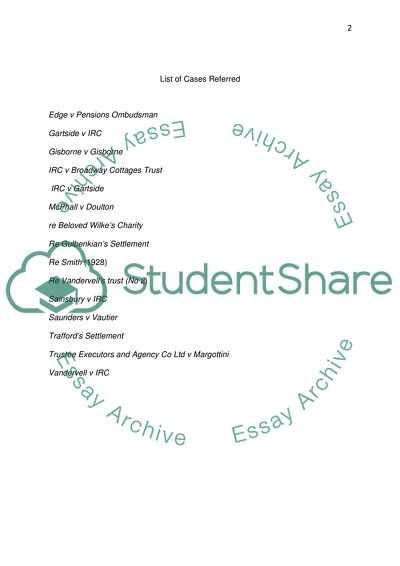Cite this document
(The Concept of Beneficiary Trust Case Study Example | Topics and Well Written Essays - 3000 words, n.d.)
The Concept of Beneficiary Trust Case Study Example | Topics and Well Written Essays - 3000 words. https://studentshare.org/law/1788328-legal-ownership-vested-in-trustees-must-be-balanced-by-identifiable-equitable-ownership-critically-discuss-this-statement-and-the-difficulties-inherent-in-it-in-relation-to-the-interests-of-beneficiaries-under-discretionary-trusts-what-is-the-p
The Concept of Beneficiary Trust Case Study Example | Topics and Well Written Essays - 3000 words. https://studentshare.org/law/1788328-legal-ownership-vested-in-trustees-must-be-balanced-by-identifiable-equitable-ownership-critically-discuss-this-statement-and-the-difficulties-inherent-in-it-in-relation-to-the-interests-of-beneficiaries-under-discretionary-trusts-what-is-the-p
(The Concept of Beneficiary Trust Case Study Example | Topics and Well Written Essays - 3000 Words)
The Concept of Beneficiary Trust Case Study Example | Topics and Well Written Essays - 3000 Words. https://studentshare.org/law/1788328-legal-ownership-vested-in-trustees-must-be-balanced-by-identifiable-equitable-ownership-critically-discuss-this-statement-and-the-difficulties-inherent-in-it-in-relation-to-the-interests-of-beneficiaries-under-discretionary-trusts-what-is-the-p.
The Concept of Beneficiary Trust Case Study Example | Topics and Well Written Essays - 3000 Words. https://studentshare.org/law/1788328-legal-ownership-vested-in-trustees-must-be-balanced-by-identifiable-equitable-ownership-critically-discuss-this-statement-and-the-difficulties-inherent-in-it-in-relation-to-the-interests-of-beneficiaries-under-discretionary-trusts-what-is-the-p.
“The Concept of Beneficiary Trust Case Study Example | Topics and Well Written Essays - 3000 Words”. https://studentshare.org/law/1788328-legal-ownership-vested-in-trustees-must-be-balanced-by-identifiable-equitable-ownership-critically-discuss-this-statement-and-the-difficulties-inherent-in-it-in-relation-to-the-interests-of-beneficiaries-under-discretionary-trusts-what-is-the-p.


